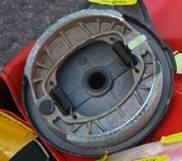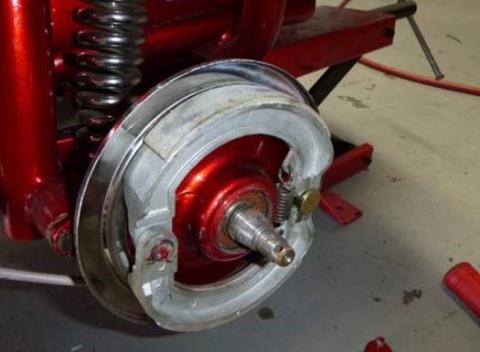Purpose
This safety alert provides information on recent imports of electrical scooters and sidecars found to have chrysotile asbestos in brake components.
Background
In March 2017, the Australian Border Force (ABF) confirmed the presence of asbestos in the brake components of electrical scooters and Vespa scooters with sidecars imported from China. The shipment was quarantined by the ABF, pending removal of the asbestos materials. No asbestos was identified within other components of the scooters and sidecars.
The scooters and sidecars were imported from China and were thought to be asbestos-free, but subsequent testing by the National Association of Testing Authorities (NATA) found some of the brake components contained chrysotile asbestos.


Contributing factors
The use of all forms of asbestos has been banned in Australia since the end of 2003. This means that the import, manufacture, supply, sale and use or reuse of asbestos and products with any level of asbestos in them is prohibited for import or use, except under very limited circumstances.
However, in many countries it is still used in manufactured products. Certification provided to importers from overseas manufacturers that goods are asbestos-free have sometimes found to be wrong for the purposes of our regulations. Local standards in some supplier countries may classify goods 'asbestos free' where they meet a certain low level of asbestos content.
Action required
Available information indicates that these scooters and sidecars do not pose a measurable health risk through normal use.
Owners should not perform any maintenance, repairs or modifications on these scooters or sidecars that may contact or disturb the parts that may contain asbestos.
If the asbestos materials are to be removed, it is important that they are removed by a person who is competent to do it safely. Appendix E of the How to manage and control asbestos in the workplace Code of Practice 2021 (669 KB) provides an example of a "working with asbestos friction materials" safe work method that can be used, including appropriate personal protective equipment, decontamination and disposal of the asbestos waste.
Importers should be aware of the varying definitions and standards applied in the country of origin and/or supply. Australian regulations apply at the border. Importers and suppliers should also be aware that in some countries Australia trades with, asbestos is added to brake components for domestic use.
The importer must ensure they do not import asbestos materials into Australia and suppliers must not supply asbestos materials. Both importers and suppliers must obtain testing certification that the goods are asbestos-free.
Therefore, suppliers, including vehicle dealerships, should be able to verify to customers that the goods don't contain asbestos. The cost of any tests or verification measures will be borne by the importer or supplier.
To reduce the risk of importing or supplying products containing asbestos, read the fact sheet Preventing goods or materials containing asbestos being supplied to workplaces in Queensland. This includes:
- how the importation of asbestos is regulated at the Australian border and the products at particular risk of containing asbestos
- what businesses must do to ensure imported products do not contain asbestos
- types of verifications that exist for Australian importers or consumers to show imported materials do not contain asbestos.
- acceptable standards for testing if materials contain asbestos.